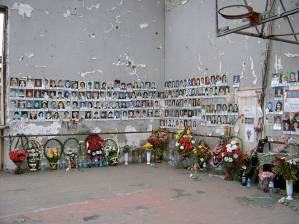Beslan: Russia finally forced to answer before the European Court of Human Rights

Ten years after the terrorist attack on School No. 1 in Beslan, relatives of some of the 330 civilians, including 186 children, who were killed, most during the storming of the school, have finally been heard at the European Court of Human Rights. A Chamber hearing was held on Oct 14 in the case of Tagayeva and Others v. Russia (application no. 26562/07)
The applicants assert that Russia violated Article 2 of the European Convention [the right to life]. They believe that the State failed to carry out its duty to protect the victims from the known risk to their lives. They also invoke Article 2 over the lack of an effective investigation into the events; and assert that many aspects of the planning and control of the negotiations and rescue operation were deficient. Some applicants maintain that the deaths were the result of a disproportionate use of force by the authorities. Some applicants further allege violations of Articles 3 (prohibition of inhuman or degrading treatment), 6 (right to a fair trial), 8 (right to respect for private and family life), 10 (freedom of expression) and 13 (right to an effective remedy) of the Convention.
The applicants are represented by lawyers from the Memorial Human Rights Centre [which the Russian justice ministry is currently tried to destroy) and EHRAC - the European Human Rights Advocacy Centre.
The hearing can be viewed at: http://echr.coe.int/Pages/home.aspx?p=hearings&w=2656207_14102014&language=en
Just after 1 p.m. on Sept 3, 2004, Russian federal troops stormed School No. 1 in Beslan where over 1100 children, teachers, parents and grandparents of children had been held hostage since the morning of Sep 1.
The storming of the building began after explosions were heard, and a large number of the casualties were due to 3 explosions and the resulting fire. Others were shot trying to escape from the building.
The authorities have always claimed that the explosions came from within the building. Explosives expert Yury Saveliev, however, believes that they were caused by grenades thrown from outside the building, and prepared a 700 page report explaining his findings which in other aspects also differ radically from the official version.
The ECHR application was brought by the NGO Mothers of Beslan who accuse the government of disproportionate use of force leading to the deaths in the gymnasium as well as because of the authorities’ failure to negotiate with the terrorists. They assert also that the authorities did not have an adequate plan for the treatment and medical care of victims and complain of the lack of an effective investigation into the events.
Russian President Vladimir Putin and all those in authority in Moscow lied from the very beginning of the hostage crisis. They claimed that there were only three to four hundred hostages. They also insisted that the terrorists were not prepared to negotiate. It is known that this so angered the terrorists on the first day that they refused to give the hostages any water.
Hostages who survived or their families found that their testimony was totally changed, and to this day the authorities have failed to answer a number of crucial questions., including why flamethrowers and tanks were used in a situation where 1100 people, many of them children, were held hostage. The court in Strasbourg may not consider the question, but many have asked since 2004 who was responsible for the poisoning in an Aeroflot plane of fearless journalist Anna Politkovskaya. She had headed to North Ossetia to negotiate with the terrorists, but ended up in hospital. Politkovskaya, more than just about anybody, would have had a good chance of achieving a peaceful solution.
In the morning of Sept 3, there were reports in the few remaining independent media sources in Moscow that Akhmed Zakayev, opposition Chechen leader who has political asylum in the UK, had even offered to come to North Ossetia to negotiate with the terrorists.
Whether those reports were true, and whether he would have been successful will never be known.





